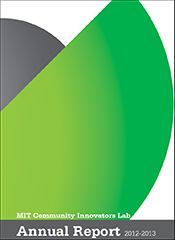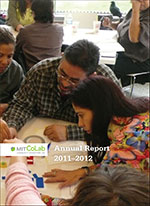Our Work
CoLab translates its vision and mission into knowledge-creation, practice, teaching, service, and professional education by:
- Providing a space for students, faculty, and community partners to improve local and regional practice through inquiry, dialogue, collaboration, and reflection.
- Generating new and relevant knowledge about urban sustainability and co-crafting theories of community engagement, development, and social change.
- Preparing new cadres of planners with the commitment, skills, and agency to lead innovation across sectors and address systemic failures.
Download the 2012-2013 annual report to learn more about CoLab’s recent projects and initiatives.
Working With Communities
CoLab faculty, staff, and student affiliates begin their work from the perspective that lived experiences of people in low-income communities and communities of color at the margins of society can provide key insights into the pervasive, structural problems facing cities today. Lived experience is a valuable source of knowledge and learning, that academics could glean valuable lessons from by joining community representatives in collaborative learning processes to generate new knowledge and innovative approaches to urban planning. The following ideas capture this approach:
Connecting to Our Values
CoLab works from a core set of personal values, and we help our students and community partners connect their work to a deep inner intention and their personal growth trajectory using methods developed by Otto Scharmer and the Presencing Institute.
Active Listening and Observation
When we work with our community partners, and when students go into the field, one of the most important first exercises is deep active listening through which we hear our partners’ experiences in their words and on their terms. We seek to understand the problems that are meaningful to them, the challenges they face, and where they find their inspiration. We combine this active listening with close, empathetic observation in which we experience the community context for ourselves, identify important players and relationships, attend to power imbalances, and connect to the essence of places.
Identifying Our Contribution
Once we have an understanding of our community partners’ context, needs, and understanding of their problems, we work with our staff and students to identify the skills, tools, and resources that we can bring the community to support their work. While we are guided by our partners’ knowledge, insight, and instincts in defining the project parameters and goals, we also value the skills and resources embedded in the MIT institutional context.
Collaborative Learning
Once we have identified areas in which we can make a contribution, we embark on collaborative learning processes in which we work with our partners to apply those skills, resources, and tools to the problem. We employ a range of methods for collaborative learning, many adapted from our former Visiting Scholar Sebastiao Ferreira, an expert in social cognition and collaborative learning processes.
Knowledge Sharing and Theory Building
As projects move forward, we capture our experiences and our partners’ experiences in written documents using analytic description. Our first goal is to capture the experience and our second is to mine that experience for knowledge and lessons that speak to pressing issues in the field of urban studies. We cover a wide range of topics from collaborative learning to waste management to cooperative development to energy efficiency.
For more information, please email us at colab-info@mit.edu.


